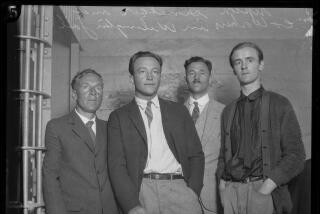Book review: ‘The Fear Within’ by Scott Martelle
- Share via
In his cogent, nuanced account of the 1949 prosecution of American communists under the Smith Act, former Los Angeles Times staff writer Scott Martelle sees this case fitting into a troubling pattern. From the Alien and Sedition Acts of 1798 to the Patriot Act of 2001, he writes, “The United States has a habit of convulsing with fear during times of stress, and in the process undercutting the very freedoms of speech, political belief and religious expression that Americans profess to hold dear.” The concerns that prompt this fear are real, Martelle stresses: There were communist spies in the 1940s, and there are terrorists at the turn of the 21st century. The steps taken to deal with them have generally been hasty and ill-considered, giving the government broad powers with unintended consequences.
The Smith Act vividly illustrates his point. Officially known as the Alien Registration Act, it was passed in 1940 to require noncitizens to register with the government. At a time when Americans were worried about foreign agents and saboteurs bringing World War II over here, few noticed the subsection making it illegal to “advocate, abet, advise or teach the duty, necessity, desirability, or propriety of overthrowing any government in the United States by force or violence.”
This was an obvious violation of the First Amendment’s guarantee of free speech, Martelle notes, but a 1919 Supreme Court decision offered a loophole: Speech could be curtailed if there was “a clear and present danger that [words] will bring about the substantive evils that Congress has a right to prevent.” By July 20, 1948, when the government indicted 12 leaders of the Communist Party U.S.A. for conspiring to advocate the overthrow of the U.S. government by force, the well-publicized hearings of the House Committee on Un-American Activities had led many Americans to believe that communists posed a clear and present danger to the United States.
Martelle provides just enough of HUAC’s history, including the sensational testimony about Soviet spy rings by former communists Whittaker Chambers and Elizabeth Bentley, to make palpable the tense atmosphere surrounding the lesser-known Smith Act trial, which he persuasively argues was even more damaging to American democracy. “McCarthy was, in effect, a bully leading a mob,” Martelle writes. By contrast, “The use of the Smith Act against Communist Party leaders was an effective attempt by the U.S. government to criminalize political belief.”
Convinced that their principles, not their actions, were on trial, the defendants in Dennis v. U.S. instructed their lawyers to elaborate, point by point, on every citation from Marx, Lenin and Stalin the government offered, so as to refute its charge that being a communist was by definition a commitment to armed revolution. Their attorneys, seasoned veterans in defending unpopular radicals, raised objection after objection to the proceedings, laying the groundwork for an appeal. “They acted,” writes Martelle, “like lawyers presuming they had already lost a rigged case.”
Judge Harold Medina grew so enraged by their aggressive tactics that at the end of the trial he ordered all five defense attorneys jailed for contempt. He had already jailed four defendants, one for refusing to answer a question on First and Fifth amendment grounds and three others for vehemently protesting the judge’s decisions. Martelle, balanced but not impartial, acknowledges the often confrontational behavior of the defense, but he makes it clear he disagrees with Medina’s assertion that this was a straightforward criminal case in which “books, ideas, and political beliefs were not on trial.”
Unsurprisingly, the defendants were convicted. After the Supreme Court denied their appeal and upheld the constitutionality of the Smith Act in 1951, four of them jumped bail and fled. It was a controversial move within the Communist Party. Some believed it confirmed the government’s contention that communists were plotting revolution; others felt the party could survive only by going underground, a position buttressed by a wave of Smith Act prosecutions in the wake of the Dennis decision. Two of the bail-jumpers were caught; two gave themselves up in 1956, believing that the U.S. was changing and “the day is not far off when the political rights of communists will be restored.”
They were correct, as it happened. On June 17, 1957, the Supreme Court, which had four new members, including Chief Justice Earl Warren, reversed a California Smith Act conviction on technical grounds. The court did not declare the act unconstitutional, but “the ruling effectively gutted the Smith Act,” Martelle notes. “The Court ruled that intent is not good enough … the proof had to show a reasonable expectation of action.” Three other decisions issued on the same day reined in HUAC and curtailed the government’s ability to fire people based on unsubstantiated innuendo; the court had reaffirmed this country’s basic commitment to civil liberties.
Writing in the 21st century, when the passions of the Cold War era have faded, Martelle does not pretend that all communists persecuted in the postwar years were blameless victims. The defendants in Dennis were tough political activists, and they did believe that socialism should replace the capitalist economic system whose injustices had led them to the Communist Party. But they were not spies, and they had taken no direct action to overthrow the U.S. government; they were tried for their beliefs under a law that violated the United States’ first and most vital amendment. Martelle’s scrupulous, lucid history resonates with contemporary relevance because it reminds us that freedom of speech and thought are most essential, not when we are feeling most confident, but when we are most afraid.
Smith is a contributing editor to the American Scholar and reviews books for The Times, the Washington Post and the Chicago Tribune.
More to Read
Sign up for our Book Club newsletter
Get the latest news, events and more from the Los Angeles Times Book Club, and help us get L.A. reading and talking.
You may occasionally receive promotional content from the Los Angeles Times.








